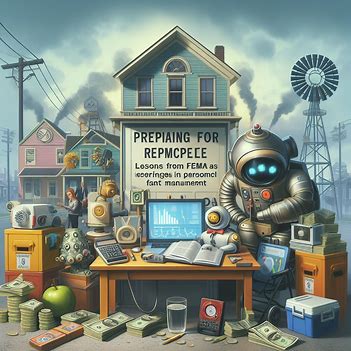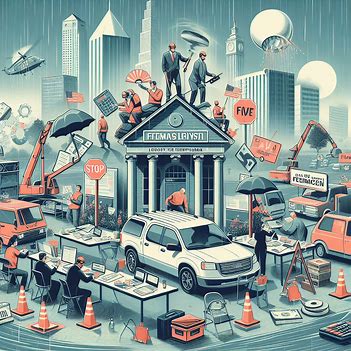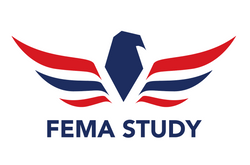
Preparing for the Unpredictable: Drawing Lessons from FEMA Tests for Personal Finance Management
Introduction:
In a world fraught with uncertainty and volatility, being prepared for the unpredictable is essential. While the Federal Emergency Management Agency (FEMA) is renowned for its disaster response and preparedness efforts, the principles it employs can be surprisingly relevant when it comes to personal finance management. By examining FEMA's strategies and tests, individuals can glean valuable insights into safeguarding their financial well-being against unexpected setbacks. This blog post delves into how the lessons learned from FEMA's approach can be applied to fortify personal finances.
Expecting the Unexpected:

FEMA's core ethos revolves around anticipating and preparing for the unexpected. Through rigorous scenario-based tests and simulations, FEMA assesses its readiness to respond to various disasters. Similarly, individuals can benefit from adopting a proactive mindset in their financial planning. Conducting stress tests on budgets and savings plans can help identify vulnerabilities and areas for improvement. By envisioning potential financial emergencies and devising response strategies, individuals can mitigate risks and enhance their financial preparedness.
Building Resilience:

Resilience is a cornerstone of FEMA's disaster management strategy. Rather than relying on a single response plan, FEMA emphasizes the importance of diversification and flexibility. This principle holds true in personal finance as well. Diversifying investments and income streams can help individuals withstand economic downturns and unexpected expenses. By spreading risk across different assets and revenue sources, individuals can bolster their financial resilience and adaptability in the face of adversity.
Emergency Fund: A Financial Lifeline:

One of FEMA's fundamental recommendations for disaster preparedness is the establishment of an emergency fund. This financial safety net serves as a lifeline during times of crisis, providing individuals with the means to cover essential expenses and navigate unforeseen challenges. Similarly, building an emergency fund should be a cornerstone of personal finance management. Ideally, this fund should be sufficient to cover three to six months' worth of living expenses. By setting aside funds in a readily accessible account, individuals can safeguard themselves against job loss, medical emergencies, or other unforeseen events without resorting to high-interest debt or depleting long-term savings.
Insurance: Protecting Against the Unknown:
Insurance plays a critical role in FEMA's disaster preparedness efforts, helping individuals and communities mitigate the financial impact of catastrophic events. Likewise, insurance serves as a vital tool in personal finance management, offering protection against unforeseen risks and liabilities. Whether it's health insurance, life insurance, disability insurance, or property insurance, having the right coverage can provide peace of mind and financial security. While insurance premiums may represent an additional expense, the potential cost savings in the event of a covered loss far outweigh the upfront costs.
Continuity Planning: Securing Future Prosperity:

FEMA advocates for continuity planning to ensure the long-term viability and prosperity of communities in the aftermath of disasters. Similarly, individuals should engage in continuity planning to safeguard their financial futures. This involves creating a comprehensive financial plan that encompasses short-term goals, such as debt repayment and emergency savings, as well as long-term objectives, such as retirement planning and wealth accumulation. Regularly reviewing and adjusting this plan in response to life changes and economic conditions is crucial to maintaining financial stability and achieving financial goals.
Education and Preparedness:
Central to FEMA's mission is the dissemination of information and resources to educate the public about disaster preparedness and mitigation strategies. Similarly, financial literacy and education play a vital role in personal finance management. Empowering individuals with the knowledge and skills to make informed financial decisions can help them navigate complex economic landscapes and avoid common pitfalls. Whether it's understanding the basics of budgeting, investing, or retirement planning, ongoing education is key to building financial resilience and achieving long-term prosperity.
Conclusion:
Preparing for the unpredictable is a cornerstone of both disaster management and personal finance management. By drawing lessons from FEMA's tests and strategies, individuals can fortify their financial well-being and navigate uncertain times with confidence. Whether it's expecting the unexpected, building resilience through diversification, establishing an emergency fund, securing adequate insurance coverage, engaging in continuity planning, or investing in education, proactive measures can help individuals weather financial storms and secure a brighter future.
